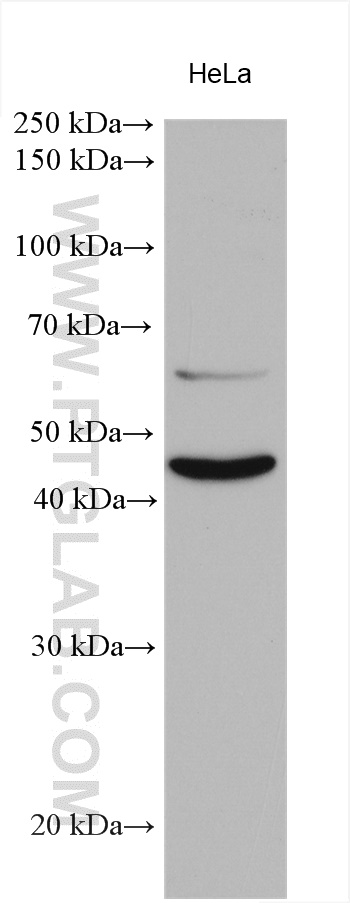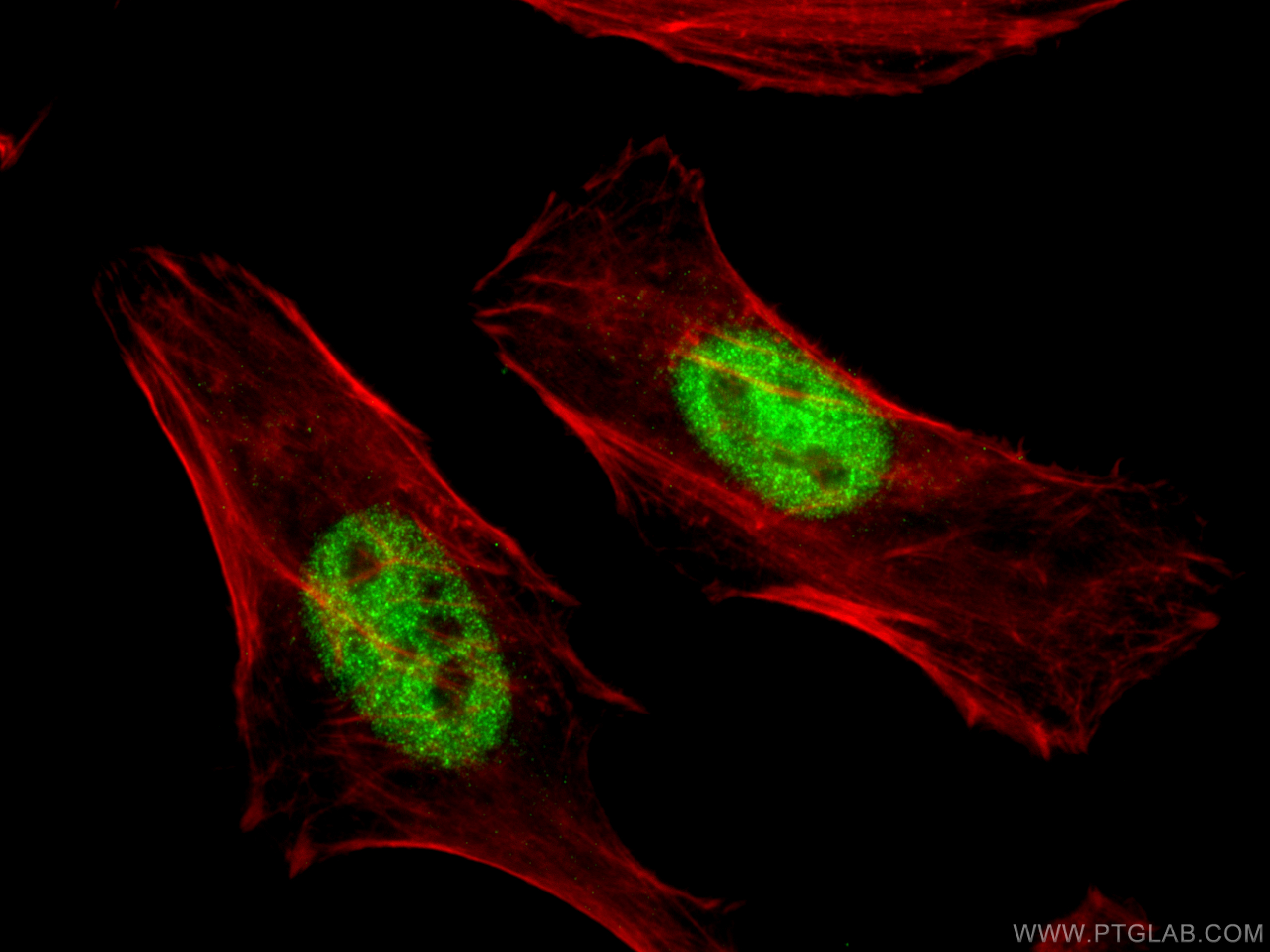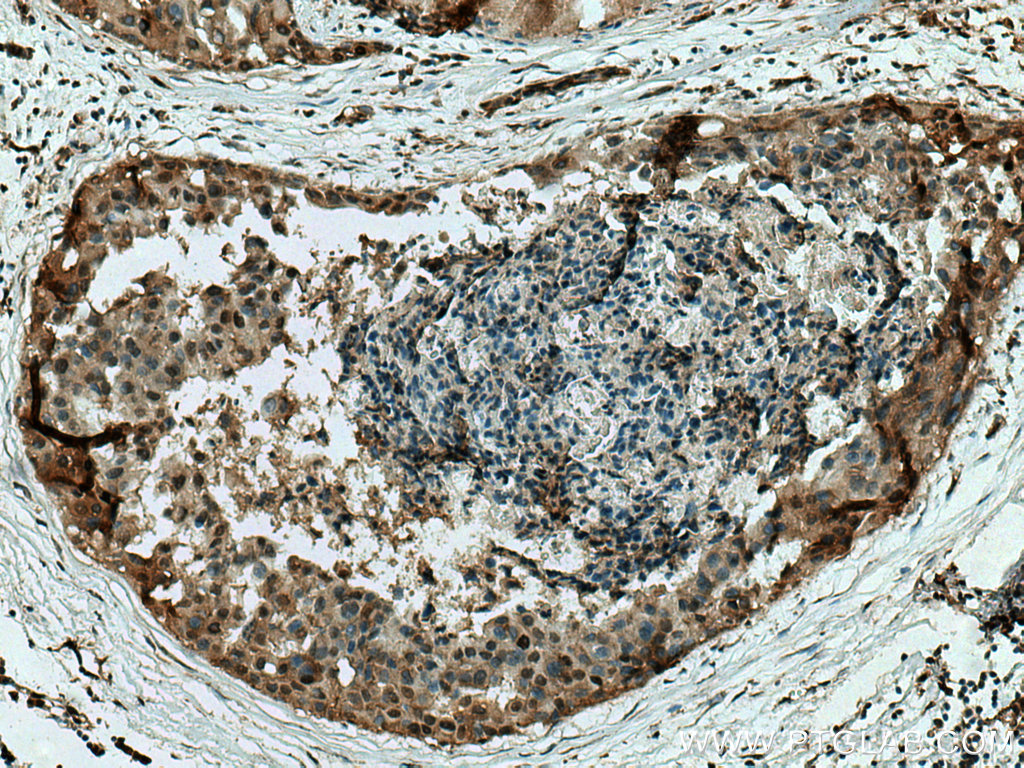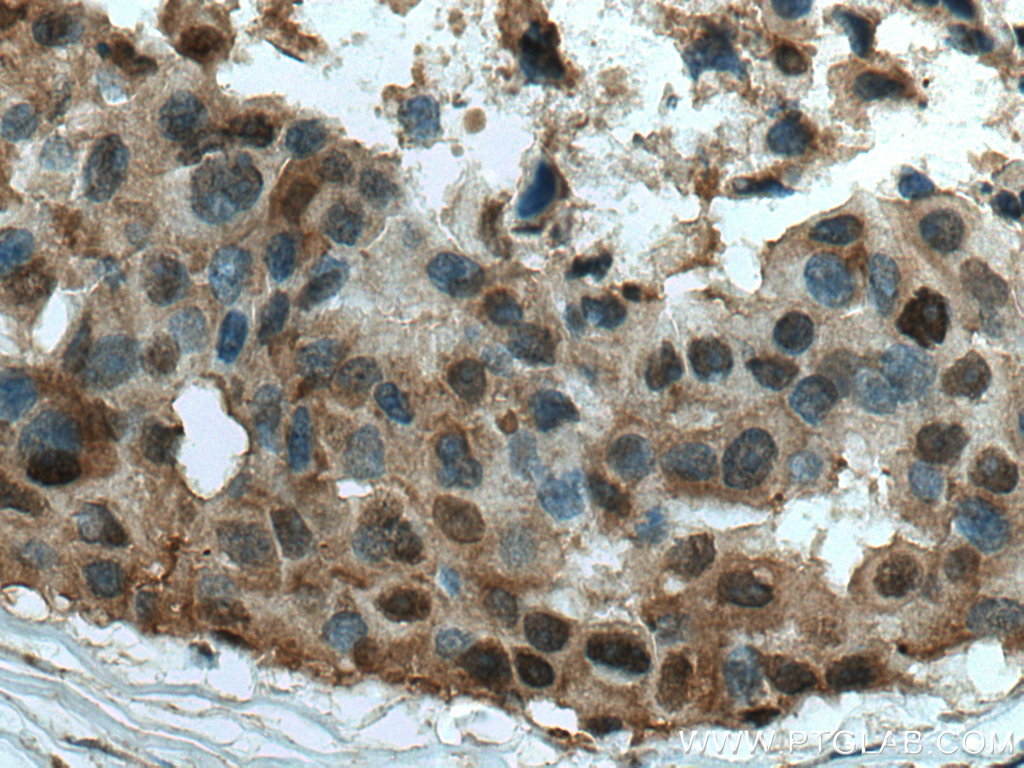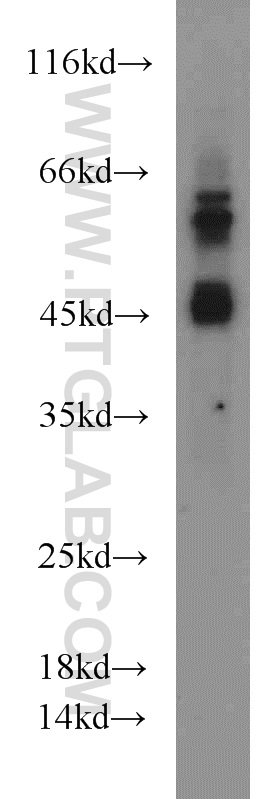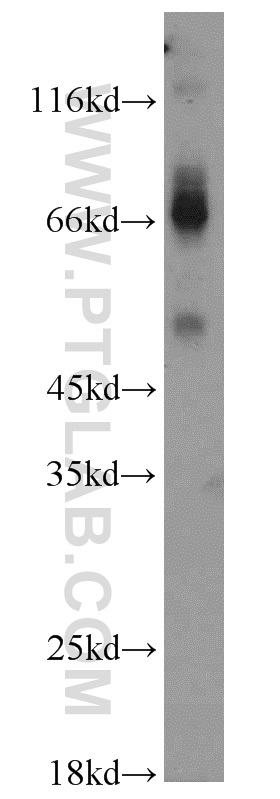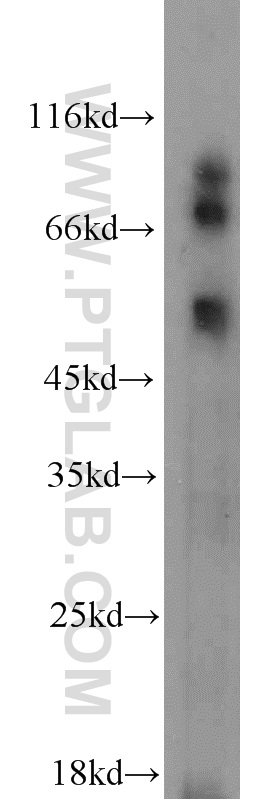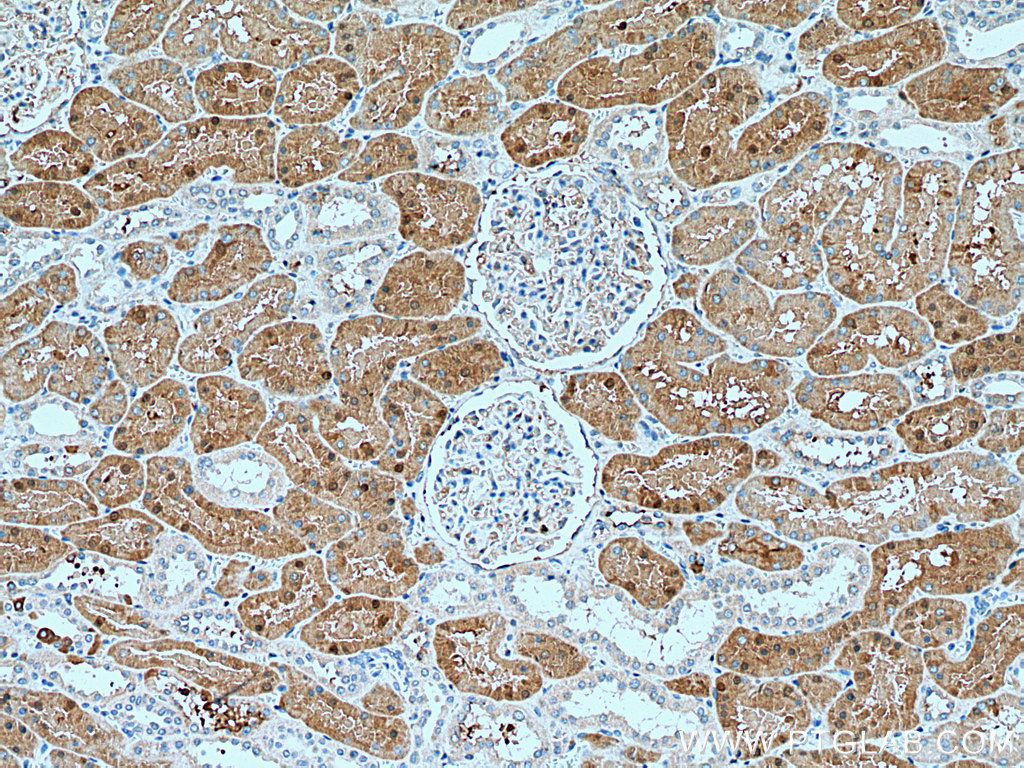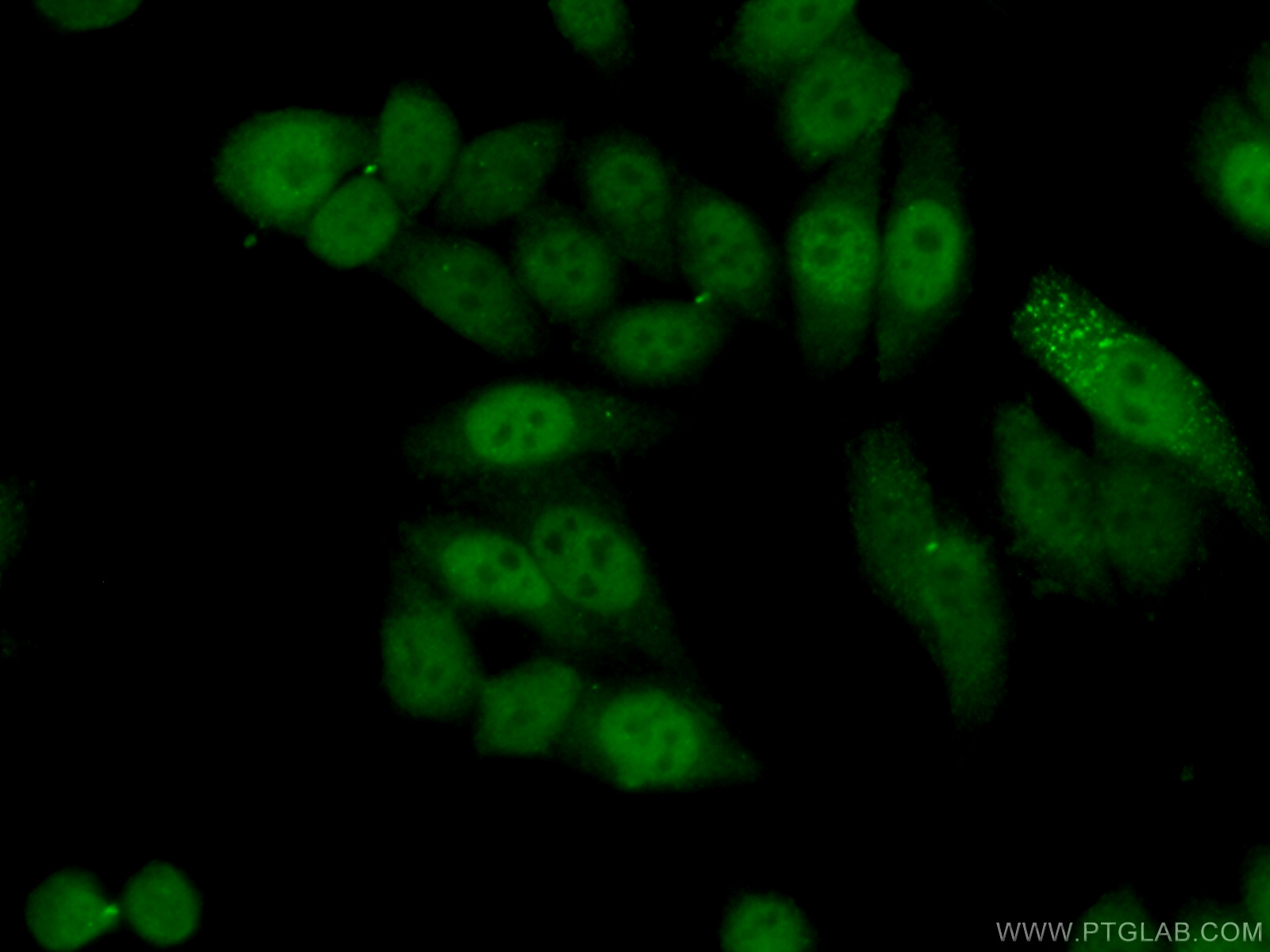验证数据展示
经过测试的应用
| Positive WB detected in | HeLa cells, A549 cells, mouse skeletal muscle tissue, mouse colon tissue |
| Positive IHC detected in | human breast cancer tissue, human kidney tissue Note: suggested antigen retrieval with TE buffer pH 9.0; (*) Alternatively, antigen retrieval may be performed with citrate buffer pH 6.0 |
| Positive IF/ICC detected in | HeLa cells |
推荐稀释比
| 应用 | 推荐稀释比 |
|---|---|
| Western Blot (WB) | WB : 1:500-1:1000 |
| Immunohistochemistry (IHC) | IHC : 1:50-1:500 |
| Immunofluorescence (IF)/ICC | IF/ICC : 1:200-1:800 |
| It is recommended that this reagent should be titrated in each testing system to obtain optimal results. | |
| Sample-dependent, Check data in validation data gallery. | |
发表文章中的应用
| WB | See 10 publications below |
| IHC | See 2 publications below |
产品信息
13949-1-AP targets MAPKAPK2 in WB, IHC, IF/ICC, ELISA applications and shows reactivity with human, mouse samples.
| 经测试应用 | WB, IHC, IF/ICC, ELISA Application Description |
| 文献引用应用 | WB, IHC |
| 经测试反应性 | human, mouse |
| 文献引用反应性 | human, mouse |
| 免疫原 | MAPKAPK2 fusion protein Ag5060 种属同源性预测 |
| 宿主/亚型 | Rabbit / IgG |
| 抗体类别 | Polyclonal |
| 产品类型 | Antibody |
| 全称 | mitogen-activated protein kinase-activated protein kinase 2 |
| 别名 | MAPKAP-K2, MAPKAPK 2, MAPKAP kinase 2, MAPK-activated protein kinase 2, MAP kinase-activated protein kinase 2 |
| 计算分子量 | 400 aa, 46 kDa |
| 观测分子量 | 47-50 kDa |
| GenBank蛋白编号 | BC036060 |
| 基因名称 | MAPKAPK2 |
| Gene ID (NCBI) | 9261 |
| RRID | AB_2877995 |
| 偶联类型 | Unconjugated |
| 形式 | Liquid |
| 纯化方式 | Antigen affinity purification |
| UNIPROT ID | P49137 |
| 储存缓冲液 | PBS with 0.02% sodium azide and 50% glycerol pH 7.3. |
| 储存条件 | Store at -20°C. Stable for one year after shipment. Aliquoting is unnecessary for -20oC storage. |
背景介绍
MAPKAPK2(mitogen-activated protein kinase-activated protein kinase 2) is also named as MK2, MAPKAP-K2, MK-2 and belongs to the CAMK Ser/Thr protein kinase family. MAPKAPK2, one of several kinases directly phosphorylated and activated by p38 MAPK, plays a central role in the inflammatory response and is in the nucleus of unstimulated cells and moves rapidly to the cytoplasm after stimulation(PMID:12171911). It is also involved in many other cellular processes including stress responses, nuclear export, gene expression regulation and cell proliferation. Multiple residues of MAPKAPK2 are generally phosphorylated in vivo in response to stress, but only 4 residues(Thr25, Thr222, Ser272, and Thr334) are phosphorylated by p38 MAPK in vitro(PMID:22351694). It has 2 isoforms produced by alternative splicing and the range of the molecular weight is 42-60 kDa according to the references(PMID:10666409; 11328854;8995385).
实验方案
| Product Specific Protocols | |
|---|---|
| WB protocol for MAPKAPK2 antibody 13949-1-AP | Download protocol |
| IHC protocol for MAPKAPK2 antibody 13949-1-AP | Download protocol |
| IF protocol for MAPKAPK2 antibody 13949-1-AP | Download protocol |
| Standard Protocols | |
|---|---|
| Click here to view our Standard Protocols |
发表文章
| Species | Application | Title |
|---|---|---|
Mol Cancer Res Sophoridine inhibits human colorectal cancer progression via targeting MAPKAPK2. | ||
Food Funct L-Theanine mediates the p38MAPK signaling pathway to alleviate heat-induced oxidative stress and inflammation in mice. | ||
Toxicol Appl Pharmacol p38 MAPK-DRP1 signaling is involved in mitochondrial dysfunction and cell death in mutant A53T α-synuclein model of Parkinson's disease. | ||
Int J Mol Med Aryl hydrocarbon receptor inhibits inflammation in DSS‑induced colitis via the MK2/p‑MK2/TTP pathway. | ||
Brain Res Bull The p38 mitogen activated protein kinase regulates β-amyloid protein internalization through the α7 nicotinic acetylcholine receptor in mouse brain. | ||
Cell Rep MK2 promotes Tfcp2l1 degradation via β-TrCP ubiquitin ligase to regulate mouse embryonic stem cell self-renewal. |
